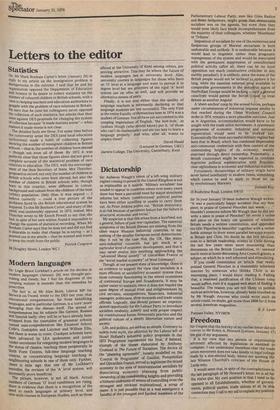Dictatorship
Sir: Auberon Waugh's vision of a left-wing military regime coming to power in the United Kingdom is not as implausible as it sounds. 'Military socialism' has tended to appear in countries where over many years there has been a perceived need for major structural reforms but where 'constitutional' political parties have been either unwilling or unable to carry them out. As Peter Jenkins points out, "British democracy is at risk because of persistent failure but the failure is structural, economic and social." My suspicion is that this arises from a localised, not a general, failure of post-war capitalism. The essential symptoms of the British disease are missing from the other major Western industrial countries, to say nothing of the smaller European social democracies. May it not be the case that the UK, like many semi-industrial countries, has got stuck at a particular level of economic development, and that it may never evolve into anything approaching the "advanced liberal society" of Giscardian France or the "social market economy" of West Germany?
Though, at our present state of knowledge, there is no evidence to support the view that socialism is a more efficient or satisfactory economic system than those currently functioning in the mixed economies of continental Europe and Scandinavia, it may be rather easier to institute, since it does not require the same degree of mutual trust and enlightenment by, civil servants, entrepreneurs, financiers, industrial managers, politicians, shop stewards and trade union officials. Logically, this should present an unprecedented opportunity for the Labour Party to introduce socialism modestly, soberly and with proper respect for constitutional forms, democratic practice and the political culture of a deeply libertarian nation and society.
Life, and politics, are seldom so simple. Contrary to widely-held myth, the adoption by the Labour left of Stuart Holland's industrial policy proposals in the 1973 Programme represented the final, if belated, triumph of the theses elaborated by Anthony Crosland in The Future of Socialism. The device of the "planning agreement", loosely modelled on the 'Contrat de Programme' of Gaullist, Pompidolian and Giscardian France, served to legitimise the mixed economy in the eyes of interventionist socialists by dissociating economic planning from public ownership of the commanding heights and providing a hitherto undreamt-of means of controlling even the strongest and trickiest multinational, a scrap of paper. It is just possible that in a real emergency a handful of the youngest and hardest members of the
Parliamentary Labour Party, men like Giles Radice and Brian Sedgemore, might grasp that democratic socialism was on the agenda, but even then they would most likely face blank incomprehension from the majority of their colleagues, whether 'Manifesto' or 'Tribune'.
Imposition of socialism by one of the numerous and fissiparous groups of Marxist sectarians is both undesirable and unlikely. It is undesirable because it would lead to dogmatic rather than pragmatic management of the system and would be associated with the permanent suppression of unauthorised political activity (after all, there can be no loyal opposition nor much constructive criticism in any earthly paradise!). It is unlikely, since the mass of the British people would not be inclined to endure it for long, while the essential external prop available to comparable governments in the industrial states of North-East Europe would be lacking — only a general cataclysm would permit the Soviet Union to treat Britain as another Angola!
A 'sheet-anchor' coup by the armed forces, perhaps under circumstances of industrial impasse similar to that reached during the Ulster Workers' Council strike in 1974, remains a more plausible outcome. Just as in Argentina, accommodation would have to be sought with the trade union movement. A systematic programme of economic, industrial and national regeneration would need to be worked out.
Economically the most successful military regime has been that in Brazil, which has combined impeccably anti-communist credentials with firm control of the commanding heights of its economy, mainly exercised through direct ownership. Presumably, a British counterpart might be expected to combine Argentine political sophistication with Brazilian clear-sightedness in economic and industrial matters. Fortunately, dictatorships of military origin have never lasted indefinitely in modern times, something which cannot be said to apply to those set up by revolutionary Marxists.


























 Previous page
Previous page